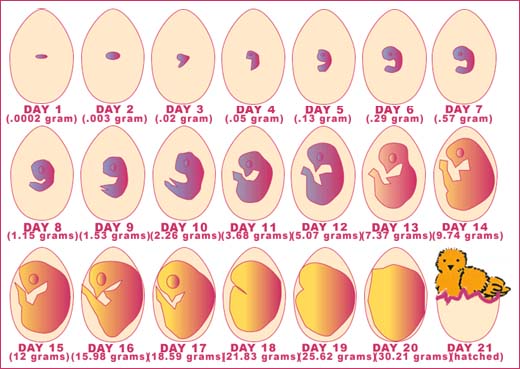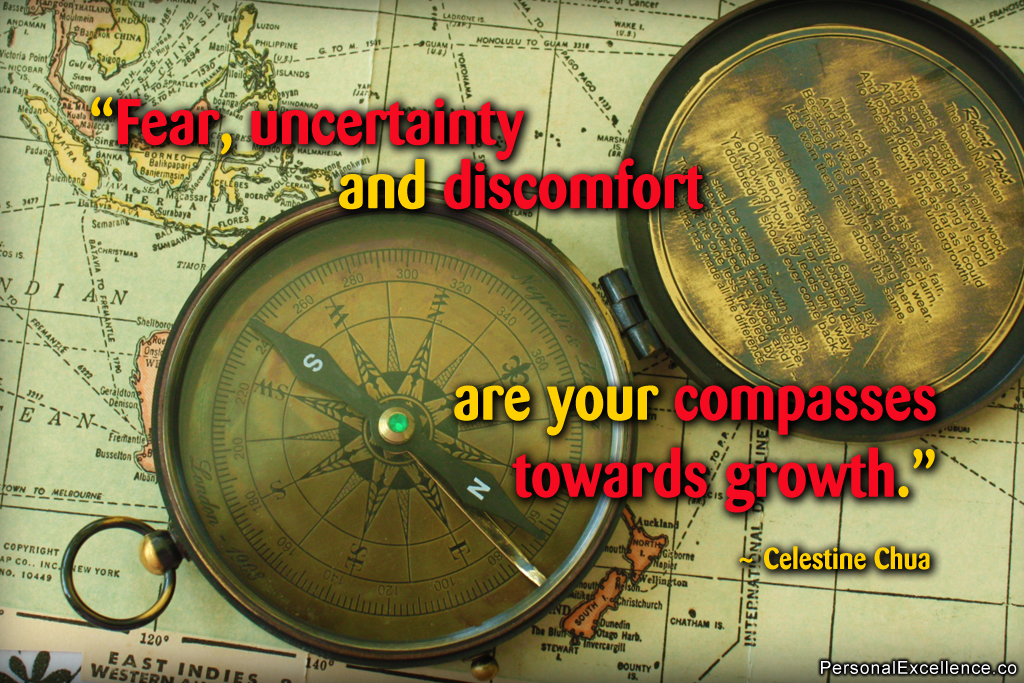Do you know what an incubation period is? It’s the length of time when an embryo develops within an egg, until it hatches.
Different types of eggs have different incubation periods. A chicken egg needs a 21-day incubation period under the right conditions (temperature, humidity, timely turning of the egg). If you crack an egg before it finishes incubating, you basically destroy the chick’s life and it loses its chance in this world.
Look at how a chick embryo develops from Day 1 to 21:

The development of a chick embryo. Just because we can’t see the chick developing inside doesn’t mean it’s not growing. (Image: Chickscope)

Developing chick embryo (Image: Microscopy UK)

A baby chick, out in the world (Image: Bosque Village)
Incubation Period Everywhere
Incubation periods can be observed in many areas of our life. For example:
- A seed’s germination process is a 2-day to week-long process which cannot be rushed.
- The development of a baby in a mother’s womb takes 38 weeks, and the mother will give birth when the child is ready to be born.
- In pathology, a flu virus takes about 2 days to incubate before the person develops flu symptoms (meaning a person who gets the flu virus will only show symptoms after 2 days).
- In baking, it takes 30 minutes for a cake to be ready. Increasing the heat will not speed up this process. Instead, it will burn the cake.
- An apple takes 100-200 days to ripen. Pick it too early and it will stop ripening.
In each case, the incubation process is necessary and cannot be rushed (not that anyone wants the flu). Even if everything looks the same on the surface, there are changes happening underneath. These silent changes are part and parcel of achieving the end result.
Likewise, our goals have incubation periods too. Just because you take action today doesn’t mean you will see results right away. For certain goals, you may need to take action for a while before you can see the rewards of your labor.
From Debt to $20k Monthly Revenue
This brings to mind my client M. When he came to me, he had a debt of USD200,000: built up throughout his 20s from study loans, bad financial habits, and frivolous spending. His goal was to clear his debt and to gain financial freedom.
As his debt was so big, clearing it was no overnight affair. There were many things we had to work through first, including working out a financial budget sheet, understanding his money beliefs (that caused him to be in so much debt), and building good money habits. Addressing his money beliefs in particular took a long time, as M started off very low in energy, unmotivated, and fuzzy in his thinking.
So despite M’s efforts, his debt issue remained the same. He was also constantly reminded of it: be it from regular bank letters asking for payment, overdraft notices when he was withdrawing money, or his inability to pay his staff on time (M runs multiple businesses). M felt imprisoned.
However, I reminded him that as his debt was the result of compounded actions over the years, we shouldn’t expect it to disappear overnight. It is more important to address the root causes of his debt, which were primarily linked to his bad money habits and attachment of his self-worth to money, because the faster we fix them, the sooner his debt situation will improve.
So we did that, and we worked on the roots of his problem, one by one. This happened over a few months.
From Financial Outflow to Inflow
Things started to change after awhile.
Firstly, he began to experience energy spurts after each coaching session. During these spurts, M would accomplish many things — the equivalent of what he normally does over two weeks. I told M that these spurts represent the abundant energy in him (just that they were blocked due to his worries), and were the start of more to come. True enough, he began to experience these energy spurts out of the blue, even when we haven’t had a call.
Then, he began to act on the action steps in his debt resolution plan, which were linked to his business growth. The results were astounding.
Because we cleared his mental blocks surrounding money, and because M has defined a clear vision for his business, he was able to laser-focus his energy on growing his business. In a matter of weeks, he began to clinch many new business deals. While his business revenue used to be $4,000 USD a month, it has since increased to $20,000 USD a month — a 5-fold increase. He continues to clinch new deals today, some of which are recurring, which means recurring income.
M has been clearing a good chunk of his debt for the past few months. At this rate, he’ll be clearing it in a year’s time. With so many new deals now, M’s problem has grown into a new one — one where he has insufficient manpower. This is of course a luxury “problem” and is easily fixable (hire new staff, increase productivity).
Needless to say, M is extremely pleased. He knows that as long as he continues what he’s doing, he’ll soon be debt-free and financially free.
What Can We Learn?
What have you observed from M’s story? Despite working on his debt issue for months, M didn’t see results right away. Instead, he only did so only after a few months. That’s because he had to work on the roots of his problem. But when the results came in, they came in… fast.
The time lag between when he started taking action and when he saw results is the incubation period. In addition, he has been building his network and working on his business skills since four years ago. This means that his incubation period for his business success started four years ago.
Similarly, when it comes to our goals, there will be times when we take action without seeing results. It doesn’t mean that what we’re doing isn’t working. It may simply mean that our goal is in a development phase, going through incubation. During this time, actions don’t instantly lead to results. Rather, they build up to create a big impact when everything reaches a critical threshold.
Are You Incubating a Goal?
For whatever goal you are pursuing now, there is always a delicate development phase at the start. This is the incubation period, when your goal is slowly taking shape. While it may seem like nothing is happening, there is something happening… just not visible to your eye.
While the incubation period for a chicken egg is 21 days, this period varies depending on our goals:
- With a blogging goal, this period can be a few days to weeks as you create your blogging account, apply a template, set things up, and write your first post. With a goal to build an A-list blog, this period is easily years as you build your expertise in the subject matter, create quality content, drive traffic, and build loyalty among your readers.
- With a career switch goal, this period can be months to even a year as you do industry research, connect with headhunters, find job vacancies, go for interviews, and wait for the right job offer. Read my talent stack article on how a recent client did a career upgrade and got a 60% pay jump.
- With a healthy eating goal, this period can be months as well, especially if you’re an emotional eater, as you remove negative eating habits, work on healthy eating, and create a positive environment that supports healthy eating.
- With a goal to quit smoking, this period can be weeks and months as you work through your addiction issues, identify your relapse patterns, and work on those roots.
- With a goal to turn your passion into your career, this period can be months, typically years, as you spend 10,000 hours to develop your talent, create your plan, take action, and refine your plan along the way.

What goals are you incubating at the moment?
Generally, the bigger your goal, the longer your incubation period, since you’d need more time to build the foundations for a larger goal.
So what happens if you’re currently incubating? Do you get pissed off at the lack of results? Do you run amok like a headless chicken out of frustration? No, of course not!!!! All these are pointless as they will only frustrate you further and distract you from your main goal.
You want to continue with what you’ve been doing (because that will lead you to your end goal) and focus on your vision. Some tips that will help:
- Set milestones to evaluate your progress. Milestones are like little signposts to guide you to your final goal. Milestones let you know if you’re heading in the right direction. Examples of baby milestones for a blogging goal can be, (1) Achieve 10 visitors/day, (2) Achieve 50 visitors/day, (3) Achieve 100 visitors/day. The equivalent for a healthy eating goal can be, (1) Eat at least one healthy meal a day, (2) Eat at least one fruit/vegetable each day.
With these milestones set, focus on achieving them (as opposed to your distant end goal). If you are hitting them, that means you’re on the right track, even if you haven’t reached your end goal yet! Set more milestones and keep moving forward. You’re on the right path!
Surround yourself with success models. Who has succeeded in this goal? Keep them close to you and under your radar, such as in your social media feed, your newsletter subscriptions, your contact list, your meetup groups, etc. This way, you get the maximum positive reinforcement for your goal. The incubation period is a delicate period, so don’t allow anything negative to come close to you during this time (or ever, really).
Look out for success Easter eggs. Many goals give clues of its progress, even if you can’t see any major change yet. When you bake a cake, you can see the mixture “rise” through the oven door. The pleasant whiff of the cake can be smelled before the baking is completed too. With egg incubation, candling (using bright light to see the details inside a shell) helps you tell if any embryo has developed.
So say you’re starting a coaching business. A possible sign is friends telling you that your advice has helped them, even when you weren’t formally coaching them. Another possible sign can be your friends recommending others to sign up for your service, even though you didn’t ask them to!
For your goal, what are possible signs of success? Look out for them! They are the universe’s way of nodding at you and saying, “Yes, you’re doing great. Keep up the great work!!!”
- Work hard. The incubation period doesn’t end with the natural passing of time. Rather, you have to do due work before you’ll see success. Stay true to your plan and work hard. Read my time management tips to get things done.
- Be patient. As the saying goes, “Good things come to those who wait.” Put in your best effort, but be patient as well. As long as you put in the due work, the results will come soon enough.
- Most importantly, enjoy the process. At the end of the day, you’re not in a race. You’re in a journey of self-betterment, and your goals are but mediums to help you live a better life. Think about why you want to pursue this goal, and enjoy the process by living true to this message every second of the day. Before you know it, the incubation period is over and your goal has taken off. :)
Be sure to check out:




![How Your Language Relates with Success [Infographic]](https://personalexcellence.co/files/infographic-self-talk-success-200x156.jpg)




 Thanks for reading. If you like my free articles, join my private email list and get my latest updates and articles sent right to your inbox.
Thanks for reading. If you like my free articles, join my private email list and get my latest updates and articles sent right to your inbox.